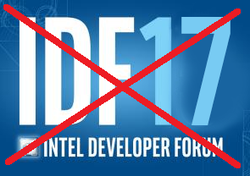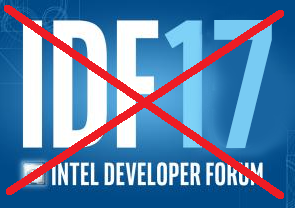
April 20, 2017
By: Michael Feldman
In a surprise announcement sent out on Wednesday, Intel revealed it will discontinue their biggest tradeshow of the year: the Intel Developer Forum (IDF). The company explained the move as a result of an evolving event calendar that features more targeted product sets.
 The immediate outcome will be the cancelation of this summer’s San Francisco IDF event in August. Earlier this month, Intel announced that it would not be hosting IDF in China this year, and that the San Francisco gathering would have a “new format.”
The immediate outcome will be the cancelation of this summer’s San Francisco IDF event in August. Earlier this month, Intel announced that it would not be hosting IDF in China this year, and that the San Francisco gathering would have a “new format.”
In years past, IDF’s main purpose was to gather the Intel faithful around its newest x86 microprocessor architecture or semiconductor process shrink, especially for the PC crowd. Since this occurred on a fairly reliable cadence related to its tick-tock cycle, the developer event could always latch on to the latest advancement. Now, however, the slowdown in Moore’s Law is stretching those cycles and product timelines considerably.
More importantly, Intel is no longer PC-focused, and its product set has extended well beyond x86 processors. Over just the past five years, the company has added interconnects (Omni-Path, silicon photonics), HPC processors (Xeon Phi), advanced solid state drives (Optane, 3D NAND), reconfigurable computing (Altera FPGAs), plus mobile, wireless and IoT chips (Atom, 5G, etc.) to its portfolio. Given the disparate audience for many of these products, collecting them all together in a single developer event didn’t seem to make much sense to Intel any longer.
Although the chips going into personal computers still represent the biggest share of Intel’s business, the company has shifted its focus into the datacenter, where it sees both bigger margins and higher growth rates. The cloud phenomenon, in particular, is galvanizing Intel’s interest in this area. The recent news that the upcoming “Skylake” Xeon processors would debut in Google’s cloud reflects the significance of this market to the business. Many of Intel’s most advanced products – the Xeon Phi, Omni-Path, silicon photonics, Optane, and FPGAs – are all bound for datacenter duty.
AI/machine learning is also in line to be a significant focus area for Intel going forward. It’s significant that the company hosted its own AI Day last November, which partially overlapped its participation in the Supercomputing Conference (SC16). It would not be surprising to see that AI gathering turn into a multi-day affair as it launches its first machine learning-based Xeon Phi and Nervana products over the next year of two. Targeted events like this seem to be the way Intel wants to do things from now on.
It will be interesting to see if the Intel puts together a datacenter-focused event, or even one targeted more specifically to HPC, reconfigurable computing, or solid state storage. We’ll find out soon enough.
